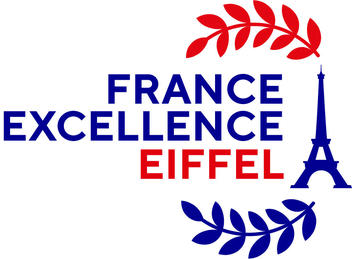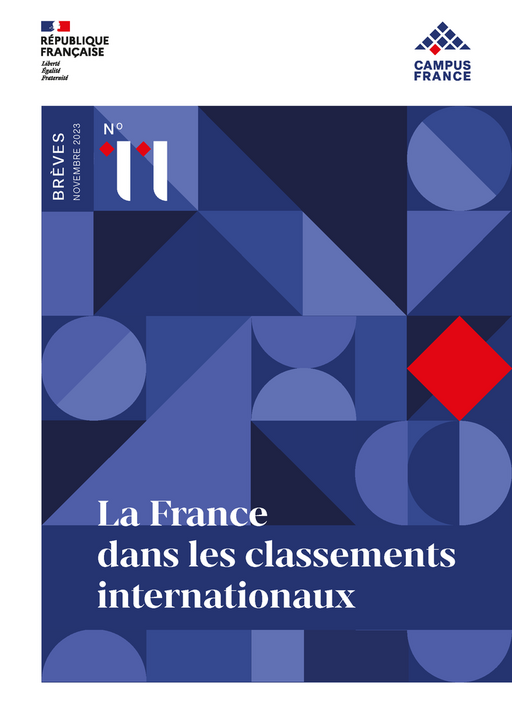
France’s place in the new version of international rankings
For ten years, France has been improving its position in international rankings. To discover all there is to know about these rankings, which French institutions are present and France’s fields of expertise, discover the new edition of this Brève by Campus France.

International rankings appeared gradually since the 2000’s to rank higher education universities and institutions, and took a gradually important place in the academic world. The release of these rankings has become a regular event, with governments, the media and higher education institutions publishing and promoting them. Competition among institutions increased, and so did strategies to better their ranks[1], including using groupings.
Rankings may be read through the criteria of number of institutions ranked (for example France boasts 27 institutions in the Shanghai ranking) and the progress of each institution (Paris-Saclay is ranked 15th in 2023). The emergence of subject rankings, more recent, turns France into a leader in specific fields, such as mathematics, ecology, oceanography or MBAs.
For ten years, France has been improving its position in international rankings, a result of groupings of institutions, (experimental public institutions) such as Paris-Saclay, PSL or Sorbonne University. Because they grow in size, such institutions are ranked better, but decrease the number of French institutions in rankings.
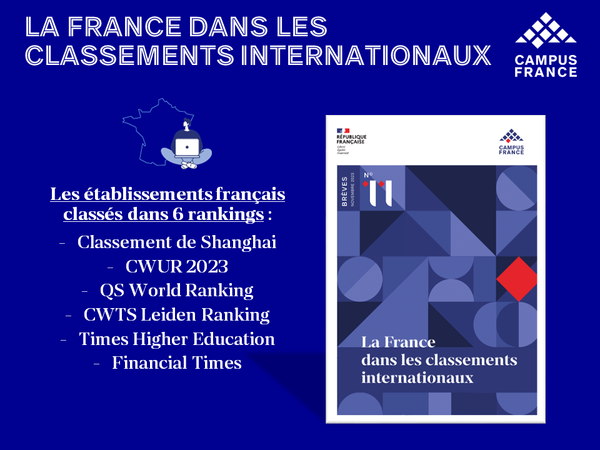
Shanghai ranking August
The Shanghai ranking was created in 2003 by the Shanghai Jiaotong University[2] and is now one of the most eagerly awaited and recognised rankings in the academic world. It compares 1000 higher education institutions on academic criteria, such as the number of Nobel Prizes and Fields Medals (past and present), the number of articles published in the Nature and Science journals and other reference indicators.
In 2023, France is 4th worldwide in number of institutions in the Top 50 of the Shanghai ranking, with 3 institutions, just after the US (28), the UK (6) and China (4), but before Switzerland (2), Canada (2), Japan (2), Denmark (1), Australia (1) and Sweden (1). In total, 27 French institutions are ranked (-1 compared with 2022), with 2/3 in the first half of the ranking (Top 500).
In 2023, four French institutions of the Top 100 win more ranks than they lose: Paris-Saclay 15th (+1 rank), PSL 41th (-1), Sorbonne Université 46th (-3), Université Paris-Cité 69th (+9).
The presence of Paris-Saclay ranked 15th allows France to claim the 3rd rank in number of institutions in the Top 20, a draw with Switzerland. Paris-Saclay is also the first non-Anglo-Saxon institution of the ranking.
In the Top 500, France has become the 6th country, tied with 18 institutions, ranked in 2023 (+2), tied with Canada (-1), but before Italy (17 institutions), but still behind Australia, Germany, the UK, China and the US.
France experienced a decrease of the number of institutions in the Top 500, after positioning 23 in 2007-2009, this number gradually decreased, including in 2019-2020 with four “outings” of the Top 500 This trend can be explained by the grouping of several institutions into experimental public institutions (EPE in French). This number goes back to 2023 with the apparition of two new institutions.
In comparison, Germany has more institutions ranked than France (45 versus 27), but in a lesser position in the ranking: the country has no institutions in the Top 50 (vs 3 for France), 4 in the Top 100 (like France), 31 in the Top 500 (vs 18 for France).
The Shanghai University also produces subject rankings: French institutions stand out, with 84 ranked in 2023, in 51 of the 55 disciplinary rankings.
France stands out particularly in mathematics, with 35 institutions ranked, including two in the top 5 (Paris-Saclay 2nd and Sorbonne Université 4th). French universities also stood out in other disciplines, taking 7% of the places in oceanography and metallurgical engineering, and 6% in ecology and medical technology.
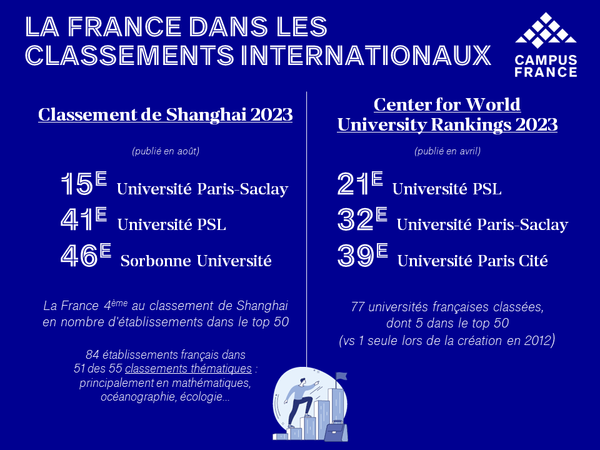
Center for World University Ranking (April)
The CWUR produces an annual ranking based on a number of criteria: quality of teaching, research and teaching staff in relation to awards received, employment rate and number of alumni reaching positions of responsibility.
The number of French institutions at the top of the ranking has increased over the years, rising from just one in the top 50 in the first edition in 2012 to five in the 2023 edition: PSL (21st), Paris-Saclay (32nd), Université Paris Cité (39th), Sorbonne Université (41st), and Institut Polytechnique de Paris (45th). In total, 77 French institutions are ranked in the 2023 edition.
CWTS Leiden Ranking (June)
Every year, Leiden University’s CWTS publishes several rankings of universities, calculated on the basis of bibliometric indicators. In 2011-2012, no French university was in the top 100 of the “scientific impact” ranking, based on the number of times articles were reprinted, whereas in 2021 two French universities are in the top 100: Paris-Saclay (88th) and Sorbonne Université (90th). In 2023, 33 French institutions are ranked (up 3 on the previous edition), but none of them is in the top 100: Paris Cité (106th), Sorbonne (110th), Paris-Saclay (123rd).
The CWTS publishes three other thematic rankings, based on the number of collaborations, the number of open access publications and the number of women authors. In 2023, it is in this last category that French universities are best positioned: five in the top 100, including two in the top 20, the University of Paris (14th) and Sorbonne Université (21st).
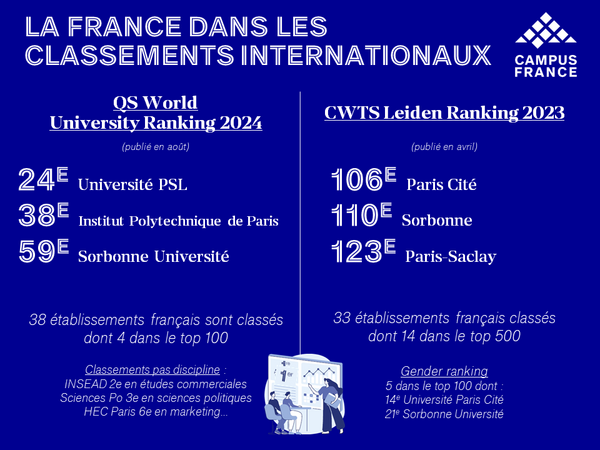
QS World University Ranking (June)
This annual ranking of universities, published by Quacquarelli Symonds since 2011, takes into account indicators such as academic reputation, number of research citations and faculty/student ratios. In the 2012 ranking, two French institutions were in the top 100 (ENS Paris and Ecole Polytechnique).
Today, in the QS 2024 published in June 2023, 38 French institutions are ranked, including four in the top 100:
- PSL (24th, up 2 places in 1 year);
- Institut Polytechnique de Paris (38th, up 10 places);
- Sorbonne Université (59th, up 1 place);
- Université Paris-Saclay (71st, down 2 places)
QS also publishes rankings by discipline, in which French institutions stand out: INSEAD (2nd in business and management studies), Sciences Po (3rd in political science), HEC Paris (6th in marketing and 10th in business and management studies)... and the Conservatoire national supérieur de musique et de danse de Paris (2nd in Performing Arts).
For the first time in 2023, QS is publishing a ranking devoted to European universities: 690 institutions from 42 countries are ranked in this QS Europe, including 50 French institutions. The four French institutions in the world top 100 are ranked in the European top 30: PSL (7th), Institut Polytechnique de Paris (21st), Sorbonne Université (25th) and Université Paris-Saclay (30th).
Times Higher Education World University Ranking (October)
Created in 2004, the THE ranking is based on several criteria: quality of teaching and research, citations, transfer of knowledge to industry and international influence. Ten years ago, eight French institutions were ranked in the top 500, including three in the top 100 (ENS, Ecole Polytechnique, Université Pierre et Marie Curie).
In THE 2024 ranking, France has a total of 44 institutions ranked (+2 compared to the previous edition). Of these, 16 institutions are in the top 500, including four in the top 100: PSL (40th, +7 places), Paris-Saclay (58th, +35), Institut Polytechnique de Paris (71st, +24) and Sorbonne Université (75th, +15), all of which have made good progress over the past year.
In the THE thématique 2024 ranking, French institutions stand out in several disciplines:
- 35 in engineering (+2 in one year)
- 33 in physical sciences (+2)
- 28 in social sciences (+3)
- 27 in computer sciences (+3)
- 23 in life sciences (+1)
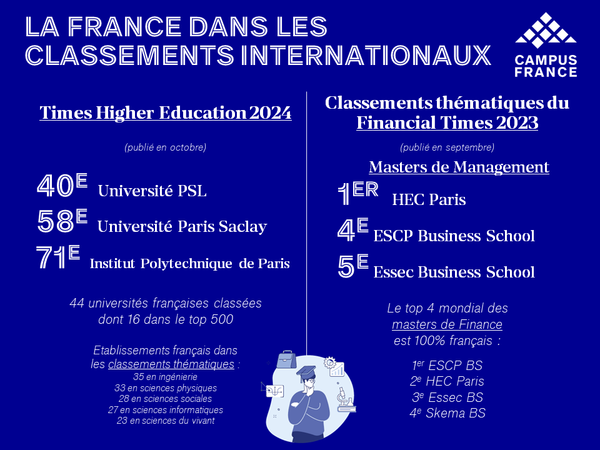
Financial Times rankings (September)
Since 2005, the Financial Times has published a ranking of the best Masters in Management (MiM). The ranking is based on 17 criteria, such as the internationalisation of the school (international courses and student mobility), the diversity of staff and students (nationality, gender), graduates’ salaries and career progression, etc. In the 2011 MiM ranking, sixteen French schools were ranked.
In 2023, France stands out with 21 schools ranked in the top 100: it is the best represented country in the world, ahead of the United Kingdom and the United States. Among the French schools, four feature in the top 10: HEC Paris (1st, up 1 place), ESCP Business School (4th, +1) Essec Business School (5th, +1), and EMLyon Business School (7th, +2).
The ranking of the best masters in finance (MiF) also illustrates French excellence, as the top 4 in 2023 are 100% French: in order ESCP BS, HEC Paris, Essec BS and Skema BS.
[1] “Taking international rankings into account in site policies” Report to the Minister for Higher Education, Research and Innovation and the Minister for the Economy, Finance and Industry - May 2017
[2] “Academic Ranking of World Universities”, produced by a research team from Shanghai Jiaotong University
Recommended News
